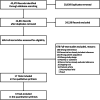Long-term effects of lower versus higher oxygenation levels in adult ICU patients-A systematic review
- PMID: 35749059
- PMCID: PMC9540426
- DOI: 10.1111/aas.14107
Long-term effects of lower versus higher oxygenation levels in adult ICU patients-A systematic review
Abstract
Background: Oxygen therapy is a common treatment in the intensive care unit (ICU) with both potentially desirable and undesirable long-term effects. This systematic review aimed to assess the long-term outcomes of lower versus higher oxygenation strategies in adult ICU survivors.
Methods: We included randomised clinical trials (RCTs) comparing lower versus higher oxygen supplementation or oxygenation strategies in adults admitted to the ICU. We searched major electronic databases and trial registers. We included all non-mortality long-term outcomes. Prespecified co-primary outcomes were the long-term cognitive function measures, the overall score of any valid health-related quality of life (HRQoL) evaluation, standardised 6-min walk test, and lung diffusion capacity. The protocol was published and prospectively registered in the PROSPERO database (CRD42021223630).
Results: The review included 17 RCTs comprising 6592 patients, and six trials with 825 randomised patients reported one or more outcomes of interest. We observed no difference in cognitive evaluation via Telephone Interview for Cognitive Status (one trial, 409 patients) (mean score: 30.6 ± 4.5 in the lower oxygenation group vs. 30.4 ± 4.3 in the higher oxygenation group). The trial was judged at overall high risk of bias and the certainty of evidence was very low. Any difference was neither observed in HRQoL measured via EuroQol 5 dimensions 5 level questionnaire and EQ Visual Analogue Score (one trial, 499 patients) (mean score: 70.1 ± 22 in the lower oxygenation group vs. 67.6 ± 22.4 in the higher oxygenation group). The trial was judged as having high risk of bias, the certainty of evidence was very low. No trial reported neither the standardised 6-min walk test nor lung diffusion test.
Conclusion: The evidence is very uncertain about the effect of a lower versus a higher oxygenation strategy on both the cognitive function and HRQoL. A lower versus a higher oxygenation strategy may have a little to no effect on both outcomes but the certainty of evidence is very low. No evidence was found for the effects on the standardised 6-min walking test and diffusion capacity test.
Keywords: critical care outcomes; intensive care units; oxygen inhalation therapy; systematic review.
© 2022 The Authors. Acta Anaesthesiologica Scandinavica published by John Wiley & Sons Ltd on behalf of Acta Anaesthesiologica Scandinavica Foundation.
Conflict of interest statement
Olav Lilleholt Schjørring and Thomas Lass Klitgaard were coordinating investigators of the Handling Oxygenation Targets in the Intensive Care Unit (HOT‐ICU) trial, and Frederik Mølgaard Nielsen is the coordinating investigator of the amended trial in COVID‐19 patients (HOT‐COVID). Bodil Steen Rasmussen is sponsor and principal investigator of the HOT‐ICU and HOT‐COVID trials. Long‐term outcomes (i.e., cognitive function evaluation and lung function tests) at 1‐year follow‐up are prespecified secondary outcomes in both trials., , Other authors declare no conflict of interest.
Figures


References
-
- Desai SV, Law TJ, Needham DM. Long‐term complications of critical care. Crit Care Med. 2011;39:371‐379. - PubMed
-
- Schelling G, Stoll C, Vogelmeier C, et al. Pulmonary function and health‐related quality of life in a sample of long‐term survivors of the acute respiratory distress syndrome. Intensive Care Med. 2000;26:1304‐1311. - PubMed
-
- Herridge MS, Tansey CM, Matté A, et al. Functional disability 5 years after acute respiratory distress syndrome. N Engl J Med. 2011;364:1293‐1304. - PubMed
-
- Stevens RD, Marshall SA, Cornblath DR, et al. A framework for diagnosing and classifying intensive care unit‐acquired weakness. Crit Care Med. 2009;37:S299‐S308. - PubMed
Publication types
MeSH terms
LinkOut - more resources
Full Text Sources

